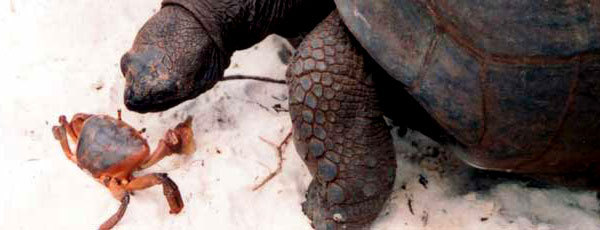Coral and Coastal Ecology of the Seychelles
- Interisland Quay, Mahe Island, Seychelles
- Volunteer Vacations

| from $2,995* per person | 123 Days | April, May |
| Comfort accommodations | Exertion level: 3 | |
| Operator: Earthwatch Institute | 12 people max | |
Loading map, please wait...
Locations visited/nearby
Silhouette Island , Indian Ocean , archipelago , Coral and Coastal Ecology of the Seychelles , ecotourism , earthwatch , sustainability, Seychelles
0 testimonials about this trip.
1 testimonial about the provider, Earthwatch Institute:
-
Reviewer: L. Reifschneider
located in
St. Louis,
MO
USA
Elephant conservation is what drives my travel destinations. However, I always come home counting the blessings of new friends and an understanding of a culture and way of life I possibly would otherwise have never been introduced to. Through the Earthwatch projects I participate in, I am learning just how big and wonderful this world is.
Itinerary
On the ExpeditionSurvey unique coastal ecosystems in the Indian Ocean and help protect them from global climate change.
Using a combination of digital photography and underwater video transects, you’ll help assess the health of one of the world’s most stunning coral reefs by measuring biodiversity and rates of coral growth around the reef and in the shallow waters of Curieuse Island, in the Seychelles. Your extensive field surveys will also help the scientists identify biodiversity hot spots, areas of reef degradation and areas that act as ecological refuge protecting corals from adverse environmental and climate effects. Simultaneously you will be involved with aquarium experiments that aim to assess the vulnerability of key coral species to climate change. The data you help collect and enter in the lab will allow scientists to identify which species in the region might be most important for tracking the effects of global climate change in the Indian Ocean.
If you'd like to participate in the diving aspects of the research, you must be scuba certified (CMAS 2 star = PADI Rescue or BASC Sports), have at least 30 logged dives, and have recent diving experience. You will also be required to bring all scuba kit.
Between full and energetic days of snorkeling, dives, and lab work you’ll have opportunities to explore the island’s nature trails or just sit back and enjoy the spectacular views and relaxing tropical climate.
Please note: A government swimming ban is in place for Curieuse Island. Earthwatch anticipates the ban will be lifted and that 2012 expeditions will run as normal. However, if joining this expedition, please do not book any travel until asked to do so by Earthwatch. We'll conduct a review in late January 2012, but should you have any questions, please contact our Expedition team.
Meals and Accommodations
Food for breakfast and lunch will be provided for you to prepare– including for a packed lunch if necessary for that day’s fieldwork. You’ll enjoy evening meals prepared by the guest house cook. Meat dishes are available rarely, but you will have fish and vegetarian meals. You’ll stay in a traditional bunk house just 20 meters/65 feet from the sea, sleeping in bunk beds and sharing a room with three or four others depending on team size (teams are gender split equally so a maximum of 4 males and 4 females per team). You’ll share the guest house bathroom of one shower (which can be cold water only), a basin, and a flush toilet.
About the Research Area
Lying about one mile to the north-east of Praslin, Curieuse Island is a picturesque member of the Seychelles archipelago. It is about two miles long and is fringed with stunning beaches of fine golden sands.
Once known as Ile Rouge on account of its red earth, Curieuse was eventually named after one of Marion Dufresne's vessels which explored the islands of the Praslin group in 1768. The island used to be a leper colony and the ruins of the old houses can still be seen, notably a restored colonial villa that was home to the island doctor in the 1870s.
Today, the island and its surrounding waters form one of six national Marine Parks of the Seychelles. The marine park boundaries extend 200m/656ft offshore and, on the west side, to the coast of the neighboring Praslin. Interestingly, these two islands are the only places where the famous Coco-der-mer (sea coconut) grows naturally. Curieuse also boasts an additional endemic vine and eight different species of mangrove. It is home to hundreds of Aldabra giant land tortoises and an important nesting site for hawksbill sea turtles.
More information from Earthwatch Institute:
- View trip on provider's website
earthwatch.org/expeditions/coral-communities-in-the-seychelle… - Company profile, experience, and history
- View all of their trips
- Email this trip page to a friend
-



Comments from Facebook